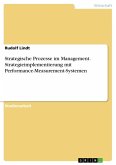Seminar paper from the year 2013 in the subject Business economics - Controlling, grade: 1,3, University of Münster (Institut für Unternehmensrechnung und -besteuerung), course: INTOP-Seminar, language: English, abstract: Hans B. Thorelli, Robert L. Graves and Lloyd T. Howells, the initial developers of INTOP, put strong emphasis on the "ubiquity of entrepreneurial opportunities and decision situations" that INTOP participants have to cope with. Against this complex background, this paper aims at showing how strategic and operative controlling instruments can be used to structure information and thus to provide support in both strategic and operative decision situations. The underlying understanding of controlling in this paper is based on Robert J. Mockler's concept of management control as "a systematic effort by business management to compare performance to predetermined standards, plans or objectives (...)". According to Mockler, controlling begins with a firm's plans and expectations, which shape its objectives and standards. These objectives and standards are considered as preconditions for performance measurement. Given its aim, this paper is split into two parts. Chapter two deals with the strategic dimension of controlling. In 2.1, the structure of the radio industry is analysed using Porter's five forces. In 2.2, the results of this analysis are used to discuss an INTOP company's strategic alternatives, following the three generic strategies developed by Porter. 2.3 includes an exemplary operationalization of the strategy of cost leadership using Kaplan and Norton's Balanced Scorecard. In chapter three, controlling is seen from its operative perspective. In 3.1, it is shown how a multiple-stage margin accounting system can be used to improve decisions concerning product policy. In 3.2, a break-even analysis is used to determine the right timing for the implementation of a regional sales organisation. In order to provide an in-depth analysis of a specific industry, this paper solely deals with the INTOP radio industry. However, the instruments applied can also be used by firms that are engaged in the vacuum cleaner industry. Since more than one strategy can lay the foundations for success in INTOP, this paper shall not dictate one particular strategy that automatically leads to success. Instead, it provides an overview of alternative strategic approaches each of which can make, if implemented appropriately, INTOP participants succeed. The selection of instruments applied in this paper is not exhaustive. The instruments that are presented were selected because they can be used to handle problems that are of high importance in the specific context of INTOP.
Bitte wählen Sie Ihr Anliegen aus.
Rechnungen
Retourenschein anfordern
Bestellstatus
Storno








